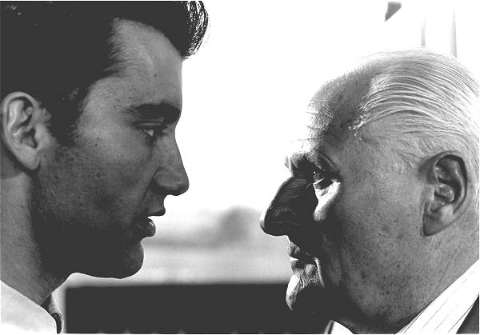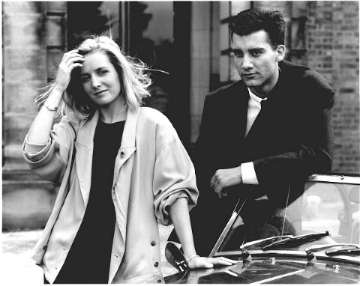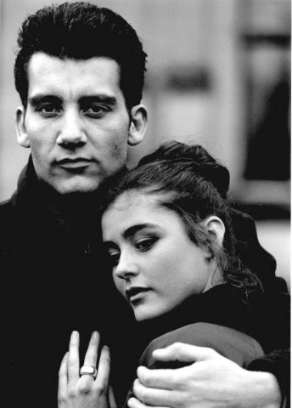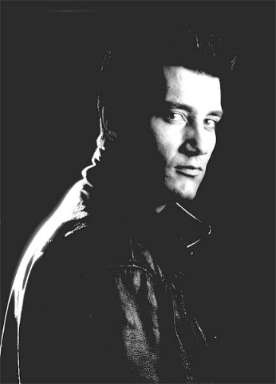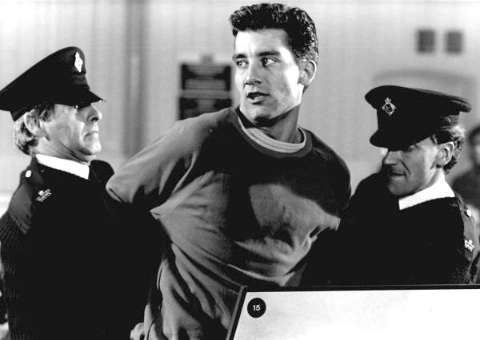
| Clive
Bio Notes from Chancer Pressbooks |
|
Bio notes from the "Chancer" (1st series) pressbook. Images and a review follow article, (Thanks to Genevieve) Clive Owen plays Stephen Crane CHANCER star Clive Owen had one small problem when he took on the role of saviour to a struggling sports car company - in real life he had failed his driving test twice. And although the 25-year-old Coventry-born actor was more than competent at driving swish Leopard cars on private road, he was determined to pass his test before filming ended: "I'd taken countless lessons over the years," confesses Clive. "I must be the British School of Motoring's best customer. They've made a fortune out of me. Landing the part in CHANCER gave me the incentive I needed and it became a matter of personal pride. I just had to pass my test to avoid embarrassment and I finally did at the end of last year." Although Clive and his character, Stephen Crane, are miles apart when it comes to driving, they share very similar backgrounds. Crane is a working-class lad from Coventry who tries his luck in the big City - Clive left school at 17, spent two years on the dole while performing with theatre groups in Coventry before chancing his luck at RADA. He's one of five brothers - two living in Japan - and his only family link with performing is through his father, a musician and country and western singer. Clive made his mark in the acting world with the British road movie VROOM, starring Diana Quick, and in the BAFTA-nominated BBC film, PRECIOUS BANE with Janet McTeer. But when he was offered the part of Stephen Crane in CHANCER, he found the prospect somewhat daunting. "At first I was very apprehensive about doing 13 hours of television but it is such a wonderful part for an actor that I jumped at it," he says. Clive features in a large proportion of the series' 13 hours and to prepare for such a marathon eight-month filming scgedule he spent several weeks working-out: "I was put on a rigid diet and fitness programme at The Fitness Centre in Covent Garden and I lost twos stones in weight," says the 6'2" actor with the dark, brooding good looks of a young Elvis Presley. "It has been said before that I look a bit like Elvis," laughs Clive, who insists that he'd much rather talk about Stephen Crane than himself. "The thing that I really like about Crane is that although he can be ruthless he is unerringly honest and never lies to anyone - he would never hurt people just to get his own way. He is dangerous but it's clear from the outset that he's no James Bond either. In the end that's one of the things that make him such a real character." * * * * * * * From "Chancer - The Story Continues" pressbook: Clive Owen plays Derek Love CHANCER brought its star Clive Owen an army of fans, plenty of job offers and public recognition as one of the brightest young talents around. And while the 26-year-old is delighted with the success of the first series, he admits the public interest in him has take him time to get used to. "I found the public property bit difficult to cope with at first," says Clive. "Being recognised in pubs or restaurants and people wanting to know whether Clive Owen was like Derek Love took me a while to get used to. I was undomfortable with it for a while and still don't enjoy the press interest, but it doesn't bother me any more." The second series of seven programmes sees Derek Love hitting rock bottom in his career and his private life. "In the first series, Derek had little to lose but in the second he's even more dangerous because he's got absolutely nothing to lose," says Clive. "Although he's devious and dangerous, in many ways he is a very moral character. The dodgy deals he carries out are always on behalf of other people, not himself." Between shooting the two series of CHANCER, Clive has starred in two films, LORNA DOONE and CLOSE MY EYES. "Lorna Doone was a typical Christmas film, a good yarn with plenty of action," says Clive. "I really fancied riding around the countryside on a horse, but in fact the filming was really hard work and I almost got frost bite it was so cold." CLOSE MY EYES has already caught press speculation because it deals with the controversial subject of incest. "It's not simply about incest," says Clive, "it's to do with the relationship between a brother and sister and about the pressures of being single in the 90's." When he finished filming last year, Clive took time off to spend with two of his four brothers who live on a small island off the Japanese mainland. "Alan has lived in Japan for about nine years and works in the music business," says Clive. "Lee, who plays the guitar, is working with him. I had a great couple of months on the isalnd away from the pressures of work. If I hadn't got a fax from Central to say they needed me to start reading scripts for CHANCER I would have stayed longer." Alan and Lee have recently returned to England to make a record for release in the UK. "I got involved with the recording and say a few words on the single, but I can't sing and don't have any of their musical talents." Clive's other brothers are Gary, who lives in Weymouth, and Scott who works in a jeweller's shop in Coventry. Clive started his acting acreer with theatre groups in Coventry before chancing his luck at RADA. After spebding the usual actor's time on the dole, he made his mark in the British road movie VROOM and then in the BAFTA nominated film PRECIOUS BANE. "I was just really lucky to get the chance in VROOM," he says." A casting director I knew suggested me and I got the part." His career since VROOM has taken off, but Clive doesn't have any particular ambitions for the future. "I want to
keep finding good projects to be involved in but I don't ave any particular
plans for the future. I have not done much theatre work in the last
few years, so I'd quite like to go back on the stage if the right part
came along." |
|
|
|
1990 - The London Times The ITV slot at 9pm on Tuesday has traditionally been reserved for snobber y with violence: shows like Capital City and Making News which seem to have been written as the dramatic equivalent of airport paperbacks, in which the characters are almost as thick as the pagination. The new one, which promises, or at least threatens to see us through into June, is Chancer, a weird mix of Serious Money and Howards Way, in which a likely lad sets out to save an ailing car factory from bankruptcy after an inferno. The clash of old and new money is, as usual, deafening, but what matters here are the supporting performances: Leslie Phillips as a wonderfully vicious old queen in charge of a City corporation, Benjamin Whitrow as the head of the ancient family firm with something nasty and distinctly Gothic going on in the attic, Peter Vaughan as the sinister foreign millionaire and, in the title role, Clive Owen, a newcomer whose acting suggests that he has already been overtaxed by the effort of posing for the cover of this week's TV Times. [ed note: How wrong they were!] The Times - 1990 The anti-sexism lessons would have, I fear, been lost on Stephen Crane, the titular opportunist of Chancer (Central TV) which started its 13-part series last Tuesday. Played by Clive Owen, Stephen is a snake with sculpted hair and a Way With Women. He leaves them stranded outside his flat with nothing on until they tell him what he wants to know. He scribbles financial projections down on their recumbent, dressing-gowned bottoms. His idea of banter is to ask: "So what's a dog like you doin' in a beautiful place like this?" To the untutored eye he's a Brylcreemed lout with a fondness for insider dealing; but for the purposes of the series he's a Jack-the-lad, whizzkid hero. The plot owed something to Capital City and Howard's Way, but also to older mythologies about noble enterprises under threat: Star Wars, say, or The Magnificent Seven. It showed us a company, Douglas Motors, that made Morgan-like roadsters but was keener on quality than market forces. In a classic goodie-meets-baddies moment, Robert Douglas (a wearily saintly Benjamin Whitrow) struggled under the lash of his bankers, whose moral dereliction could be gauged by their lexical fogginess: "Unless you can demonstrate radical new management initiatives, principally along the lines of substantial rationalisation of employees ..." Push off, creep, we muttered, sotto voce. Enter Crane, fresh from a blonde in a bathtowel and a barney in a boardroom. Could he save the company? Crane laid it on the line. "The sort of individual prepared to bail you out of this operation," he opined, "is a complete dickhead. Luckily the world is full of them." The rest of Guy Andrews' opener demonstrated how true this was. Everyone but Crane was either a loser, a failure, a snob, a wimp, a gudgeon or another blonde en route to his bathtowel. "You're such a devious little oik," sneered Crane's City superior, played by a camp and bibulous Leslie Phillips, "I wonder why I let myself be advised by you." Frankly, unless the quality of his advice improves Crane's Law No1 has variously been "Never say die", "Live fast, die young" and "It's not what you do; it's who knows you're doing it" I shall be wondering that myself. London Times 1991 Chancer - The Sequel -- Very occasionally, a television series creeps up on you like damp rot, getting into the system before you even know it is there. The best example of that last year was Chancer, in which the slippery-but-irresistible Stephen Crane saved a sports car company by nearly killing it off, tossed and lost for the hand of his arch-enemy's daughter, and shopped himself for former acts of fraud. Now he's back, or at least Derek Love is back, for as the second series started (ITV, Tuesday), we found Crane getting out of jail, going straight-ish, and going by his own name, which if nothing else means that Clive Owen (who plays him) is less likely to be faced with that age-old challenge: "'Ere, aren't you that Stephen Crane off the telly?" whenever he goes shopping. Many of the ingredients that made the first series work are back, too. Owen is still broody and unpredictable, Leslie Phillips and Peter Vaughan are still after his skin, and no sooner does one beautiful woman drop out of his life (what with this and House of Cards, Susannah Harker is cornering the market in fatal plunges) than another one drops in. Chancer has also retained the most important ingredient of all in the tricky business of making popular drama popular it still has pace. Scenes change faster than a panto set, and the story is pushed along so briskly that a visit to the loo is likely to cost you two brawls, a love affair and the collapse of a merchant bank. Despite all this, Chancer addicts may find it easier to kick the habit this time around. The first series worked because, by happy chance, a good strong leading character emerged quite naturally out of a good strong plot. Perhaps Central should have quit while it was ahead. Instead, it has been tempted into giving Chancer another run for its money a decision which might prove costly, because by the end of the first episode we were still waiting for a storyline to catch up. More From The London Times 1991 That's something a lower register of the imagination drove many people to do for Chancer (ITV, Tuesday), last year, but the sequel exerted no such hold. Chancer turned out to be a one-idea idea, and the second series pushed along by a succession of improbable scams and ending with one of those warehouse shoot-outs that even the Dirty Harry movies gave up years ago should never have been made. The trick was that you never quite knew whether Clive Owen's fantastical wheelings and dealings would end in tears, but by the end of the final episode everybody was in tears. His friends, enemies, even his girlfriend's ghost seemed to be bawling their eyes out at variously wasted loves, lives and opportunities. The only member of the cast who didn't cry was the baby, which is odd, considering that it had been kept captive in a cardboard box for days, blasted at with a shotgun and shuffled from hand to hand like the booby prize in a pass-the-parcel game. Maybe the child was just glad the thing was over. The main waste was of Michael Kitchen, an actor of astonishing skills who should be doing better things than playing psychotic boyfriends of unlovable women in not-good-enough pop dramas. Despite his effortless ability to steal a scene, however, he didn't get the best moment. That came in the penultimate episode, when (in order to con money out of the banks) Owen and Peter Vaughan scandalised the neighbourhood by threatening to build an ugly, tasteless, vulgar theme park in the grounds of an impoverished stately home.
Sadly, the cast might be good at chip-pan fires, but they're not ablaze with charisma. The little thing forlornly trying to make her mark as the only woman in Red Watch needs better lines if we are to stay tuned. |
